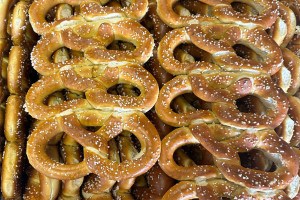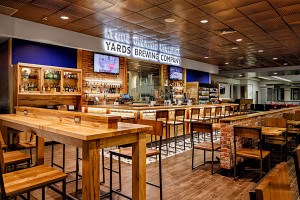The 40-Year Legacy Behind the Award-Winning Vietnam Restaurant
Benny Lai, owner of the Chinatown institution, shares his family’s story and reflects on the decades of work that went into winning a James Beard America’s Classic Award.

From left: Dave Lai, Thuyen Luu, Benny Lai, and Ley Lai. / Photograph courtesy of the Lai family
Behind the Line is Foobooz’s interview series with the people who make up Philly’s dynamic bar and restaurant scene. For the complete archives, go here.
Any conversation about the best sandwiches in Philadelphia will inevitably include mention of Fu-Wah Mini Mart, a truly mini grocery store and deli counter that opened in 1982 to supply groceries to the growing Vietnamese community in Philly. Today, they’re known for their bánh mì, especially the vegetarian tofu version, which people come from all over the city to eat.
Husband and wife team Thuyen Luu and Nhu Lai operated the grocery store for two years before expanding to Chinatown with Vietnam Restaurant in 1984. Their son, Benny Lai, took over the business at age 22, and in 2008 they opened a third restaurant, Vietnam Cafe, which is just around the corner from Fu-Wah. Earlier this year, Vietnam Restaurant was named a recipient of the James Beard Foundation’s America’s Classic Award, a category that highlights “locally owned restaurants that serve quality food, have timeless appeal, and reflect the character of their communities.”
I sat down with Benny to talk about the evolution of Vietnamese food in Philadelphia, his commitment to consistency, and how he’s helped his family businesses thrive for forty years.
My first memory of the business is … driving to New York four or five times a week to bring back products for the grocery store. When we first started out, there were around 300 families of Vietnamese refugees in Philadelphia, and there was only one Vietnamese grocery store in South Philly. So my dad decided to work with a company in New York to bring wholesale ingredients to Philly. He would drive things down late at night, and my mom was home, restocking the shelves.
Fu-Wah’s iconic tofu hoagie came from … one of my aunts. We used to have a lot of vegans in the area, and they kept asking for something vegetarian, because we were only selling, like, regular cold cuts. So I told my aunt, because she’s a vegetarian, “Can you make something vegetarian?” She started making tofu bánh mì and people really liked it.
I took over the business because … I was in school at Temple, and my mom called me to say that one of her cooks and one of her servers had decided to partner together and go out and open [another Vietnamese restaurant]. I had to drop everything. At that time, we were still small and we couldn’t really hire anyone. I ended up falling in love with it, and the rest is history.
When we first started serving Vietnamese food … our customers were mostly Vietnamese and Chinese. When a non-Vietnamese person would come in, you would just see everything stop for like two seconds. More non-Asian customers started coming in around 1986, and then in 2000 we [hired PR] and they were like, “We have to let more people try your food.” So we started hosting press dinners, and then people started coming in from the Main Line, from Chestnut Hill. They wanted to try our food, so I spent a lot of time answering questions and showing them how to eat it, like, this is something you eat with your hand, this is something you have to eat with chopsticks. People would come back and they’d say, “Oh, Benny knows what I like.”

Photograph courtesy of Vietnam Restaurant
I used to memorize … 80 percent of my customers’ names and orders, back when I was in the dining room every day. They would come in like two or three times a week, so I would know exactly what they wanted to eat.
I’ve learned that … I have to figure out how to approach people, and tell them something familiar so they’ll try new things. For example, with [little kids], if I say salt-and-pepper chicken, they’re not so sure, but if I say, “This is my version of a chicken nugget,” they’ll say, “Oh, okay.” We do the same thing with rice rolls — bánh cuốn — the thin rice noodles with chicken inside. I had to change the name to say “Okay, this is Vietnamese ravioli,” and then they sell like hot cakes.
When I first heard about the James Beard award … I said, “Are you sure?” But it’s kind of amazing. It’s probably increased the business by like 50 percent, and a lot of those people have never had Vietnamese food. I can tell who is a new customer and who has been in before, and I tell my staff, you know, keep an eye on them, make sure they know what they’re eating.
My favorite thing about running these businesses … is to see the regulars keep coming back. Sometimes I jump in with the dishwasher, and if I see a lot of leftover food that people aren’t taking home, I’m like, “What’s going on?” Sometimes I taste it to make sure it’s right. In a bigger restaurant, I rely on more people for help, and sometimes they forget or they might miss something. Consistency is the most important thing in the restaurant business. It’s very important to me and very important to my mom. That’s why I love a scale. Everything has to be measured on a scale.
I like my pho … just plain. I just like the flank steak.
I like my bánh mì … with grilled pork.


